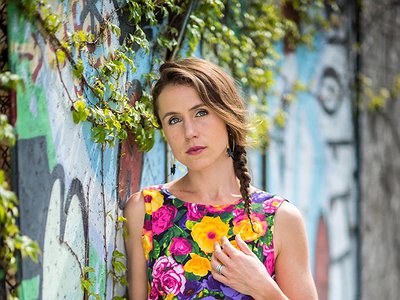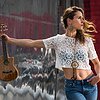Name: Joanna Wallfisch
Nationality: British
Occupation: Vocalist, Composer, Arranger
Current Release: Gardens in my Mind on Sunnyside Records
Musical Recommendations: She's already doing very well, but Aurora is an artist who I think is incredibly special. I would also recommend Jean Rohe, a singer-songwriter in New York City who is an amazing writer and one of the most dedicated musicians I know.
Website: If you enjoyed this interview with Joanna Wallfisch, you can find out more information on her website.
When did you start writing/producing music - and what or who were your early passions and influences?
I guess the first song I wrote in a fully realized form was in 2010, and was a short song called "I Wish." I was studying jazz at the Guildhall School of Music and Drama in London, and I had started experimenting with garage band and layering my own voice to compose and create harmonies. My early influences in music are varied. I was born into a household of classical musicians, and surrounded by classical music all the time. My parents never played music on the stereo, so I mostly listened to what they were rehearsing as I was growing up. When I was 11 I discovered jazz, and Ella Fitzgerald was my first true love in music.
For most artists, originality is first preceded by a phase of learning and, often, emulating others. What was this like for you? How would you describe your own development as an artist and the transition towards your own voice?
I spent my teenage years emulating the great jazz singers of the 20th century, especially Ella and Sarah Vaughan. I also loved Celine Dion, and would often sing my heart out to her music, trying to reach those soaring and powerful notes. Jazz was always a great vessel for me because of the element of improvisation. I have always loved poetry and creating rhymes and melodies spontaneously and when I discovered I could do this live, with a band, it was the start of my love and understanding for how perfect a jazz setting was for me. The journey to finding my own voice within music has been a steady evolution of listening, studying, observing and experimenting. I guess I've always felt a strong need to be “myself”, even down to the sound of my voice when I sing, I've tried to not to sound like anyone else or sound 'jazzy' or fit into any other sound world for that matter. I've just focused on being true to myself and in doing so, I have experienced a very true response from audiences as well.
As for my songs and style, they certainly started off jazzy, but that's no surprise given I was studying jazz composition at school. Now, however, they are far simpler, residing more in the folk or even pop realm, though I won't shy away from expanding sections for improvisation if it feels right and true to the story and the music.
What were your main compositional- and production-challenges in the beginning and how have they changed over time?
In the beginning, my main challenges were lack of technique and facility. Also, when you start out, you only have so much experience. Now I feel pretty fluent on my instruments, I have many devices for writing songs, and I've learned software, such as Logic and Protools, so I can record my music at home when I need to.
Tell us about your studio, please. What were criteria when setting it up and how does this environment influence the creative process? How important, relatively speaking, are factors like mood, ergonomics, haptics and technology for you?
My studio is super simple. I have a beautiful spinet piano, and all my other instruments—ukulele, guitar, flute and loop pedals—are all surrounding me. I record into Logic and use a Neumann KMS105 mic. The space itself is my home, but I keep it sparse, light, airy and very tidy. I need natural light and fresh air in my living and workspace to keep me clear-headed and peaceful. I also have very little furniture, which means I have floor space in which to change the space; sometimes I'll have a whole string quartet or band in my room, and sometimes it's only me, but there is always room for these creative transformations. I am able to work any time of the day; I'm not one of those "only work at night" people. Mornings are my favourite times, but if a song comes to me at midnight, I'll happily stay up until it's done.
What are currently some of the most important tools and instruments you're using?
I play piano, ukulele and I use a loop pedal to create vocal soundscapes for my songs.
Many contemporary production tools already take over significant parts of what would formerly have constituted compositional work. In which way do certain production tools suggest certain approaches, in which way do they limit and/or expand your own creativity? Are there any promising solutions or set-ups capable of triggering new ideas inside of you as a composer?
The only production tool I ever use for composition is my loop pedal, and this is usually just to figure out an acapella vocal arrangement or else experiment with choral backing vocal parts or rhythmic ideas for my songs. Otherwise, I compose completely acoustically: on the piano or my uke. I create the skeleton and then build on it later. I've started working with a producer to see how my songs fit in a more electronic, beats-driven setting. I find it super exciting, especially since the song comes from a totally acoustic place.
Could you describe your creative process on the basis of a piece or album that’s particularly dear to you, please? Where do ideas come from, what do you start with and how do you go about shaping these ideas?
Ideas usually come from my personal life experience. The last song I wrote, called ‘The Truth’, came from a letter I wrote to somebody declaring my love for them. Knowing I could never give them this letter I found myself writing a song instead. My starting point varies; sometimes it's an instantaneous movement from thought to music, sometimes I mull on an idea for a long time without even knowing it's going to find its way into my music. I just have to be open to that sense of the miraculous, and ready for the muse to strike.
As far as shaping my ideas, it all depends on the song. Performing new songs live always helps to give them shape and understand what form they need to be in. I play in many different formations: solo, duo, with band and also with string quartet. I love orchestrating my songs for strings and band; it's like painting to me. I stretch my canvas (the song), and then I get to paint it. But I also love that my songs are amoebic in the sense of being able to grow and shrink depending on the setting, while keeping the core strong so it can exist perfectly in all these forms.



